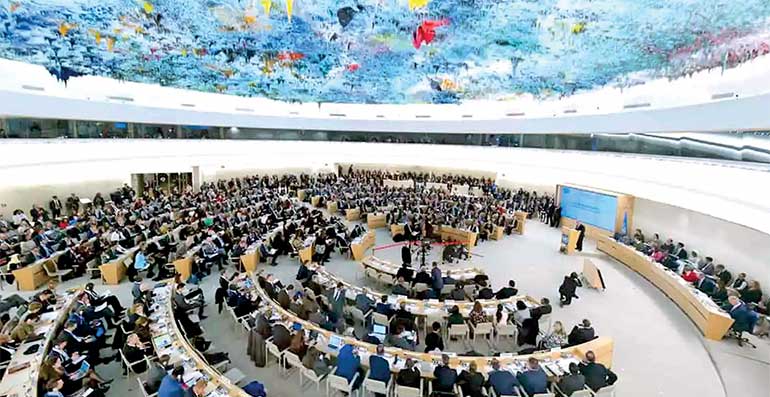Tuesday Feb 17, 2026
Tuesday Feb 17, 2026
Monday, 3 October 2022 01:33 - - {{hitsCtrl.values.hits}}

Presently Sri Lanka has a pretty bad national and international profile with regard to human rights defenders. Human rights defenders however are proliferating despite this fact
 Who are ‘human rights defenders’? Anyone, professionally or outside of a professional organisation, who seeks to protect and defend human rights. They are identified by their actions, and as such, a student campaigning for democracy or climate action, a politician protecting the rights of the citizens to be free from hunger and other human rights abuses, a collective campaigning against corruption, are ‘human rights defenders’.
Who are ‘human rights defenders’? Anyone, professionally or outside of a professional organisation, who seeks to protect and defend human rights. They are identified by their actions, and as such, a student campaigning for democracy or climate action, a politician protecting the rights of the citizens to be free from hunger and other human rights abuses, a collective campaigning against corruption, are ‘human rights defenders’.
In Sri Lanka, recent examples of human rights defenders would include those fighting for justice and accountability for the victims of the Easter bombing, or for the rights of the citizens to food, freedom of expression and assembly.
In Geneva, the proposed draft resolution on Sri Lanka to be taken up at the Human Rights Council this week has an entire Operative Paragraph (OP) dedicated to the protection of human rights defenders:
“Further calls upon the Government of Sri Lanka to protect civil society actors, including human rights defenders, to investigate any attacks and to ensure a safe and enabling environment in which civil society can operate free from hindrance, surveillance, insecurity and threat of reprisals.”
Clearly, the sponsors of the resolution, namely the USA, UK, Canada, Germany, Malawi, Montenegro, North Macedonia, feel that Sri Lanka falls short in this regard, and that the world has to be put on alert on the matter. If adopted at the Council, we will see how many more of the 47 members agree with this view.
Attacking human rights defenders
The UN Human Rights Office says that “In most cases, acts committed against human rights defenders are in violation of both international and national law.” It warns that “domestic legislation which itself contravenes international human rights law is used against defenders”.
Is Sri Lanka guilty of this? Do we recognise ourselves in the following scenario, or any part of it, that the Office of the High Commissioner describes in a general analysis of the plight of human rights defenders worldwide?
“…Arbitrary arrest and detention of human rights defenders are common, and most often conducted without arrest warrants and in the absence of any official charge.”
“Periods of preventive detention, without any judicial review, are sometimes very long and occur in very poor conditions of detention…”
“…Human rights defenders are kept under surveillance and have their telephone lines cut or tapped. They have their travel and identity documents confiscated, preventing them from going abroad to address human rights forums.”
“In some instances, human rights defenders are the object of criminal or other charges leading to prosecution and conviction. Peaceful demonstrations, lodging an official complaint against ill-treatment by police, participation in a meeting of indigenous rights activists or unfurling a banner commemorating victims of human rights violations have all led to prosecution on charges as varied as bribery, public disturbance and hooliganism. Court sentences in these cases have included long terms of imprisonment, forcible commitment to psychiatric institutions and ‘reeducation through labour’.”
(OHCHR Fact-Sheet 29 on Human Rights Defenders)
I’d say that this shows that some countries evidently have a much worse record than we do. ‘Reeducation through labour’ is a bit much. ‘Rehabilitation’ sounds less offensive, though if applied to human rights defenders, it is offensive nevertheless.
‘Preventive detention’ is familiar to us, and to Mary Lawlor the UN Special Rapporteur on Human Rights Defenders, who urged President Ranil Wickremesinghe most recently, not to sign the detention order for Wasantha Mudalige, Hashantha Jeevantha Gunathilaka and Galwewa Siridamma Thero under the PTA, warning that doing so would ‘would be a dark day for Sri Lanka’. President Wickremesinghe proceeded to darken the day regardless, and those mentioned are still detained under the PTA.
Freedom to criticise
Once, during the Presidency of Mahinda Rajapaksa, a couple of members of the JVP had their freedom of expression violated by the local police which the courts put to rights when a case was filed.
A JVP political ‘pandol’ in the south of the island had been burned by some undemocratic elements. This naturally incensed the organisers, and a few members of the JVP, suspecting it to be the work of Government supporters, decided to hold placards criticising the head of state and his Government’s disrespect of democratic norms. The wording including “Is this democracy?” in addition to more “annoying” phrases which included adjectives referring to the ‘Rajapaksa Government” as “big and dirty” or “immensely dirty”, and according to the judgment, seems to have also included a call to “topple” the Government.
That they decided to do this along the road that was to have the head of state pass by in a convoy, caused the local police to arrest the protesters. The JVP members took the matter to court and the resultant judgement clarified that:
“To cause any annoyance or embarrassment to a Head of State or the Government will not form the basis of a prosecution under Section 120 of the Penal Code. Essence of Section 120 is whether the words in question incite the People to commit acts of violence and disorder, and not whether the words are defamatory or not”.
At this time, when there is widespread criticism of the Government and of the head of state, that is a useful reminder. The ‘pandol’ judgement establishes our right to criticise: “Every citizen has a right to criticize an inefficient or corrupt government without fear of civil as well as criminal prosecution”. This right is currently being widely exercised.
Clarifying further the limits of the manner in which one can safely criticise, it was pronounced by the courts that “…as a matter of law, merely vehement, caustic and unpleasantly sharp attacks on the government, the President, Ministers, elected representative or public officers are not per se unlawful”.
The judgement shows that our rights are well safeguarded by the third pillar, our judiciary, even though the Police may have needed reeducation:
“The call to ‘topple’ the President or the Government did not mean that the change was to be brought about by violent means. It was a call to bring down persons in power by removing the base of public support on which they were elevated…If the throwing down was to be accomplished by democratic means, the fact that the tumble may have had shocking or traumatic effects on those who might fall is of no relevance. It is the means and not the circumstances that have to be considered.” (Court Case: SC/FR/768/2009)
So, the calls for early elections in order to change this administration to one with a fresh mandate, or in the case of the President, simply any mandate, from the people, are safely legal.
Usefully, the ‘pandol’ judgement SC/FR/768/2009, decided on in 2015, also declares that trying to persuade the President or Government to do the right thing when it is felt that they are in error or defective in their procedures, is not an offence either:
“It is not an offence under this section by intending to show that the President or the Government of the Republic have been misled or mistaken in measures or to point out errors or defects in the Government or any part of it, or in the administration of justice, with a view to the reformation of such alleged errors or defects, or to excite the People of Sri Lanka to attempt to procure by lawful means the alteration of any matter by law established, or to point out in order to their removal matters which are producing or have a tendency to produce feelings of hatred or ill-will between different classes of the People of Sri Lanka.”
Although this is just one judgement, it is enough to give enormous relief to the many who are engaged in the exercise of their right to express their opinion, sometimes vehemently and forcefully, on behalf of those who dare not speak out.
The UN Declaration
The UN Declaration on Human Rights Defenders says that everyone has the right to criticise their government, either individually or in association with others, “to submit to governmental bodies and agencies and organizations concerned with public affairs criticism and proposals for improving their functioning and to draw attention to any aspect of their work that may hinder or impede the promotion, protection and realization of human rights and fundamental freedoms.”
Adopted by consensus at the General Assembly, the whole world showed its commitment to respect this right.
The current holder of the mandate of the Special Procedure to ensure this right is Irene Khan, appointed in June 2020, the first woman to hold this mandate. She was formerly Secretary-General of Amnesty International for a good long stint from 2001 to 2009, and knows Sri Lanka well.
Next year, 2023, will be the 25th anniversary of the adoption of this Declaration which recognised for the first time the Right to Defend Human Rights. It will also be the year when the High Commissioner will be presenting oral updates of the situation of human rights in Sri Lanka at the UNHRC in March and June, and a written update in September, if the Sri Lanka draft resolution is adopted this week.
Presently Sri Lanka has a pretty bad national and international profile with regard to human rights defenders. Human rights defenders however are proliferating despite this fact, and given the ongoing economic crisis, more voices such as theirs will have to express their opinion on behalf of us all, risking the annoyance of those in authority by ‘vehement, caustic and unpleasantly sharp attacks’ about their ‘immensely dirty’ style of governance.